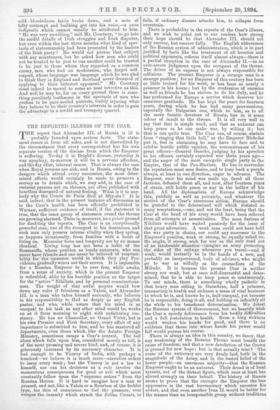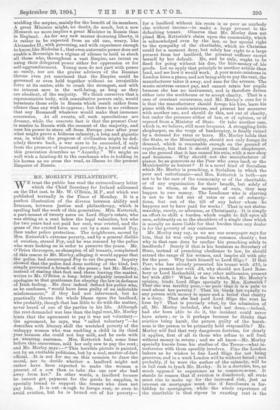THE REPORTED ILLNESS OF THE CZAR. T HE report that Alexander
III. of Russia is ill is probably founded upon serious facts. The state- ment comes in from all sides, and is not discredited by the circumstance that every correspondent has his own separate version of the disease from which the Emperor is suffering. To-day it is Bright's disease, yesterday it was apoplexy, to-morrow it will be a nervous affection, and the day after, internal cancer. That is always the case when Royal persons are sick, and in Russia, owing to the dangers which attend every succession, the most deter- mined efforts would certainly be made to preserve a secrecy as to details which, we may add, in the case of eminent persons not on thrones, are often published with heartless disregard of natural feeling. What is it to any- body why the Comte de Paris died at fifty-six P It is said, indeed, that in the present instance all discussion as to the Czar's health has been officially prohibited in Warsaw, sufficient evidence of itself, if the statement is true, that the inner group of statesmen round the throne are growing alarmed. There is, moreover, no a priori ground for doubting the reports. The Czar is an exceptionally powerful man one of the strongest in his dominions, and such men only possess intense vitality when they spring, as happens occasionally, from families with a habit of living on. Muscular force and longevity are by no means identical. Living long has not been a habit of the Romanoffs, whose position as lonely autocrats, who can never have friends and can never be relieved of responsi- bility for the itnmense world in which they play Pro- vidence, gradually wears out their nerves. It is impossible for a Russian Emperor to be ever free, while awake, from a sense of anxiety, which in the present Emperor is redoubled, alike by his horrible position as the target for the " active " Nihilists, and by personal conscientious- ness. The weight of that awful sceptre would bow down any ruler if frivolous as a Valois, and Alexander is a man who takes himself seriously, who believes in his responsibility to God. as deeply as any English pastor, and who, while aware that his mind is as unequal to his task as any other mind would be, works on at it from morning to night with unfaltering con- stancy. He has no Chancellor, no Grand Vizier, but is his own Premier and First Secretary, every affair of any importance is submitted to him' and he has mastered all departments, even those which, like the Asiatic Foreign Ministry, sometimes escape a Czar's control. The toil alone which falls upon him, considered merely as toil, is of the most pressing and severe kind, and, of course, it is grievously increased by its necessary character. It is bad enough to be Viceroy of India, with perhaps a hundred—we believe it is much more—executive orders to issue every week ; but the Viceroy is not a law to himself, nor can his decisions as a rule involve the momentous consequences for good or evil which" must constantly follow upon the "supreme orders" from the Russian throne. It is hard to imagine how a man so pressed, and not, like a Valois or a Bourbon of the feebler type, too thin of conscience to feel the pressure, ever escapee the insanity which struck the Julian Gassers, or fails, if ordinary disease attacks him, to collapse from overstrain.
There is probability in the reports of the Czar's illness, and we wish to point out to our readers how strong their hope should be that Alexander III. should not only recover, but recover fully. The English abhorrence of the Russian system of administration, which is in part justified by facts like the treatment of all heretics and political opponents, reflects itself almost always—there is a partial exception in the case of Alexander IL—in an over-severe judgment upon the occupant of the throne. The driver of an express is not always responsible for collisions. The present Emperor is a strange man in a strange position; for no Emperor of this century has been so little trained for his work, or has been so nearly. a prisoner in his house; but by the confession of enemies as well as friends he has striven to do his dufy, and he has performed for Europe a service which deserves her conscious gratitude. He has kept the peace for fourteen years, during which he has had many provocations, especially the Bulgarian one, which to bun, as to all the more fanatic devotees of Russia, has in it some colour of insult to the throne. It is all very well to say that that is simple work, and that an autocrat can keep peace as he can make war, by willing it ; but that is not quite true. The Czar can, of course, abstain from "ringing that little bell," as the Emperor Nicholas put it, but in abstaining he may have to face and to subdue hostile public opinion, the remonstrances of his great officers—General Gourko, judging by his speeches to his officers, certainly expected war three years ago— and the anger of the most energetic single party in the Empire, that of the Pan-Slavists. He has to surrender the reputation most men desire, and to keep back a people always, at least in one direction, eager to advance. The Emperor, once his mind was made up, faced sit these factions, defeated them all, and now, after fourteen years of strain, still holds peace or war in the hollow of his hand. All the diplomatists of Europe acknowledge this, publicly as well as privately, and whatever the motive of the Czar's strenuous action, Europe ohould be grateful to the determined will which resisted so many temptations,—one, and not the least, being that the Czar at the head of his army would have been relieved from all attempts at assassination. The most furious of Nihilists would have waited passively for the issue of that great adventure. A weak man could not have held the war party in chains, nor could any successor to the Emperor's position, weak or strong, be equally relied on. He might, if strong, wish for war as the only road out of an intolerable situation—imagine an army protecting the sides of the railway whenever you travel—and if weak, would instantly be in the hands of a new, and probably an inexperienced, body of advisers, who might go to war as wilfully as the counsellors of the Mikado. It is because the present Ozer is neither strong nor weak, but at once self-distrustful and deter- mined, that he is able to keep peace so continuously. To our minds, there is something wholly pathetic in that heavy man sitting in Gatschina, half a prisoner, transacting in health and sickness a mass of vital business to which he is, and knows he is, half-unequal, yet because he is responsible, doing it all, and holding on inflexibly all the while to his beneficent determination. We detest the Russian system of Government, but we heartily wish the Czar a speedy deliverance from his bodily difficulties and a full restoration to health. Even a long sickness would weaken his hands for good, and there is no evidence that those into whose hands his power would fall would pursue his course. There is always an idea in this country, we fancy, that any weakening of the Russian Throne must benefit the cause of freedom, and that a new devolution of the Crown is ground for new hope ; but is that actually true ? The roots of the autocracy are very firmly laid, both in the magnitude of the Army, and in the rooted belief of the lower people—an enormous majority—that the Russian Emperor ought to be an autocrat. Their dread is of local tyrants, not of the distant figure, which once at least has stirred. strongly on their behalf. The history of Russia seems to prove that the stronger the Emperor the less oppressive is the vast bureaucracy which executes his orders, and. that even another Ivan II. would be better for the masses than an irresponsible group without traditions wielding the sceptre, mainly for the benefit of its members. A great Minister might, no doubt, do much, but a new Monarch no more implies a great Minister in Russia than in England. As for any new master decreeing liberty, it is rather to be expected from an old one, weary, like Alexander II., with governing, and with experience enough to know, like Nicholas I., that even autocratic power does not enable a Sovereign in a rdgime of silence to hold. in check all those who, throughout a vast Empire, are intent on using their delegated power either for oppression or for self-aggrandisement. Young men do not part with power so easily, nor are the graver advisers of the Russian throne even yet convinced that the Empire could be governed or even held together without an irresistible force at its centre, able to crush the strongest, and with no interest save in the well-being, as long as they are obedient, of the majority. We think ourselves that a representative body, with consultative powers only, would terminate those evils in Russia which result rather from silence than any wish to oppress ; but there is no evidence that any Romanoff whatever would make that immense concession. At all events, all such speculations are dreamy, while the concrete fact is that the present Czar is master in Russia with the consent of the majority, and uses his power to stave off from Europe year after year what might prove a hideous calamity, a long and gigantic war, in which the progress of civilisation might be defi- nitely thrown back, a war sure to be succeeded, if only from the pressure of increased poverty, by a burst of what this generation describes as "Anarchy." We might as well wish a fainting-fit to the coachman who is holding in his horses as we cross the road, as illness to the present Emperor of Russia.







































 Previous page
Previous page